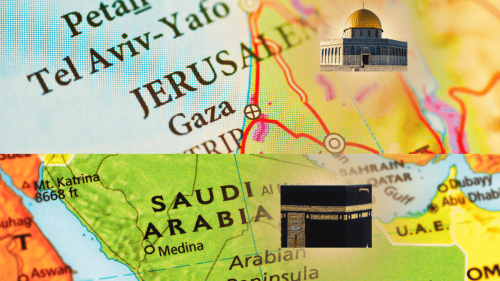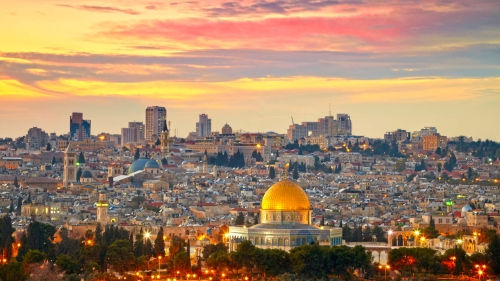Why Early Muslims Prayed To A Distant Masjid

Some Islamic scholars say that during all or most of the years that Muslims lived in Makka, and the first year and a half that the transplanted community lived in Medina, they all prayed facing north to the distant (765 miles) sanctuary in Jerusalem. But, according to a hadith in Sunan Abu-Dawud: “Narrated Mu'adh ibn Jabal: Prayer passed through three stages and fasting also passed through three stages.”
Now, which way you face during community prayer, is not the most important thing. The Qur’an (2:177) tells us: “Righteous is not that you turn your faces toward the east or the west, but righteous is [in] one who believes in Allah, the Last Day, the angels, the Book, the Prophets; and gives wealth in spite of love for it, to relatives, orphans, the needy, the traveler, those who ask [for help], and for freeing slaves; [and who] establishes prayer and gives Zakah; fulfilling their promise when they promise; and are patient in poverty, hardship and during battle. These are the ones who have been true, and it is these who are the righteous.”
Nevertheless , if prayer passed through three stages with the last being facing Makka, and the next to last being facing Jerusalem, what was the first stage? Probably during the first stage the Muslims were divided.
Many Muslims did not want to face the very close sanctuary, which they had all attended prior to becoming Muslims because. as they had all personally seen, it was filled with idols that had been there for centuries, perhaps even millennia.
For some people, facing this idol filled sanctuary was an embarrassing disgrace to the memory of Prophets Abraham and Ismael, and they preferred to face Jerusalem as the Jews and the Eastern Orthodox Church Christians did. For other Muslims, it was a challenge to be overcome by patience and faith.
The important thing was for the community was to all be united in facing the same way. In the second stage all agreed to face Jerusalem for the sake of unity. This probably occurred after the Prophet Muhammad’s Isra and Miraj; or about the time of the First Pledge of Aqaba. The transition to the third state is described by the Hadith as follows:
“Narrated Mu'adh ibn Jabal: Prayer passed through three stages and fasting also passed through three stages. The narrator, Ibn al-Muthanna, narrated the story of praying facing the direction of Jerusalem. He said: The third stage is that (after) the Apostle of Allah came to Medina he prayed facing Jerusalem, for thirteen months. Then Allah, the Exalted, revealed the verse: "We have seen you turning thy face to Heaven (for guidance). Now We shall make you turn (in prayer) toward a qiblah which is dear to you. So turn your face toward the Inviolable Place of Worship, and (Muslims), wherever you may be, turn your face toward it" (Qur’an 2:144). And Allah, the Revered and Majestic One turned (them) towards the Ka'bah. (Sunan Abu-Dawud Book #2, Hadith #0507)
Very few people realize that for more than 1.000 years, while the Ka'ba in Makka built by Prophets Abraham and Ishmael was polluted by idols, Jerusalem's First and Second Temple--Bait ul Muqaddas—Beit Ha Miqdash stood and as the Torah declares, “Celebrate Hajj Sukkot (in the Jerusalem Temple) for seven days after you have harvested the produce of your threshing floor and your winepress. Be joyful at your festival—you, your sons and daughters, your male and female servants, the Levites, the foreigners, the fatherless and the widows who live in your towns.” (Torah Deuteronomy 16:14)
The foreigners mentioned in the above verse were Hanifs, individual non-Jewish monotheists who followed the teachings of Prophets Abraham, Ishmael and Isaac. When Prophet King Solomon dedicated the Jerusalem Temple (1 Kings 8:23) “he said: “Lord God of Israel, there is no God in heaven above or on earth below like You, who keep Your covenant and mercy with Your servants who walk before You with all their hearts… “Moreover, concerning a (Hanif) foreigner, who is not of Your people Israel, but has come from a far country (Arabia) for Your name’s sake for they will hear of Your great name and Your strong hand and Your outstretched arm, when he comes and prays toward this temple, hear in heaven Your dwelling place, and do according to all for which the (Hanif) foreigner calls to You, that all peoples of the earth may know Your name and fear You, as do Your people Israel, and that they may know that this (Jerusalem) Temple which I (Prophet Solomon) have built is called by Your name. (1 Kings 8:41-43)
Thus, from the time when Prophets Abraham and Ishmael rebuilt the Kaa’ba to the present, with the exception of a 500 year period between the Roman’s destruction of the Jerusalem Temple (in 70CE) and the birth of Prophet Muhammad, a Bait ul Muqaddas—Beit Ha Miqdash has been available to recycle the Holy Spirit in the world in accordance with this long established sacred narrative that was transmitted orally in both Arabic and Hebrew for many centuries and finally written down in several versions in the mid 19th century.
Two brothers who had inherited land from their father, divided the land in half so each one could farm his own section. One brother’s land was mostly on a hillside; the other brother’s land was mostly in a valley on the other side of the hill.
Over time, the older brother married and had four children, while the younger brother was still not married. One year there was very little rain, and the crop was very meager. This was at the beginning of a long term draught that would turn the whole valley into an arid, treeless, desert where grain did not grow and all the springs dried up.
The younger brother lay awake one night praying and thought. "My brother has a wife and four children to feed and I have no children. He needs more grain than I do; especially now when grain is scarce."
So that night the younger brother went to his silo, gathered a large bundle of wheat, and climbed the hill that separated the two farms and over to his brother's farm. He left his wheat in his brother's silo, and returned home. Earlier that very same night, the older brother was also lying awake praying for rain when he thought:
"In my old age my wife and I will have our grown children to take care of us, as well as grandchildren to enjoy, while my brother will probably have no children. He should at least sell more grain from the fields now, so he can provide for himself in his old age."
So that night, the older brother also gathered a large bundle of wheat, climbed the hill, left it in his brother's silo, and returned home. The next morning, the younger brother was surprised to see the amount of grain in his barn seemed unchanged. "I must not have taken as much wheat as I thought," he said. "Tonight I'll be sure to take more."
That same morning, the older brother standing in his barn, was thinking the same thoughts. After night fell, each brother gathered a greater amount of wheat from his barn and in the dark, secretly delivered it to his brother's barn. The next morning, the brothers were again puzzled and perplexed. "How can I be mistaken?" each one thought. "There's the same amount of grain here as there was before. This is impossible! Tonight I'll make no mistake - I'll take two large sacks.”
The third night, more determined than ever, each brother gathered two large sacks of wheat from his barn, loaded them onto a cart, and slowly pulled his cart through the fields to his brother's barn.
At the top of the hill, with only a little light from a new moon, each brother noticed a figure in the distance. When the two brothers recognized the form of the other brother and the load he was pulling behind, they both realized what had happened. Without a word, they dropped the ropes of their carts, ran to each other and embraced.
Christians and Jews believe the hill is Jerusalem. Muslims believe the valley is Mecca.
I believe they are both right and God willing, someday everyone will see both cities and their sanctuaries as a pair of lungs; that are central to humanity’s spiritual inspiration by, and in connection to, the One God of Prophets Abraham, Ishmael and Isaac.
Only God can make a geographical place into a holy space. Thus God’s prophets later knew that brotherly love and concern for each other had made this space into two holy places, as a pair of spiritual lungs for two holy sanctuaries on which the descendants of these two brothers will each build and rebuild a holy House for this world’s spiritual revival.
As the Qur’an states: “'Believers, be steadfast in the cause of God and bear witness with justice. Do not let your enmity for others turn you away from justice. Deal justly; that is nearer to being God-fearing.” (Quran 5:8)
When all those, both near and far, who revere their house as a standard for the world, and share it in love with everyone else who reveres it, then God will help them: “Make this a land of Peace, and provide its people with the produce of of the land”. (Qur'an 2:126).
May the inspiration of this ancient tale, transmitted orally for so many centuries in both Arabic and Hebrew, help Christians, Jews and Muslims overcome the many hate filled actions occurring in today’s world. As the Qur’an states: Good and evil deeds are not equal. Repel evil with what is better; then you will see that one who was once your enemy has become your dearest friend…” (41:34)
May the one pair of lungs provide the spiritual energy all humans need to live according to God’s peace: ”Say: the Holy Spirit has brought the Revelation from your Lord in Truth, in order to strengthen those who believe, and as guidance and glad tidings to Muslims.” (Qur’an 16:102)
And as the Hebrew Prophet Joel (2:28-9) states: in Messianic times the Holy Spirit will be poured out upon all the People of Israel; and according to a statement in the seventh century rabbinic Midrash Tanna debe Eliyahu, (Friedman edition): the Holy Spirit will be poured out equally upon Jews and non-Jews, men and women, freemen and slaves.
Then all the children of Prophets Adam and Abraham will learn to live in Holiness, Peace and Prosperity. And as Prophet Isaiah predicted (19:23-25): “On that day there will be a highway from Egypt to Assyria. The Assyrians will go to Egypt and the Egyptians to Assyria. The Egyptians and Assyrians will worship together. On that day Israel will be the third, along with Egypt and Assyria, a blessing on the earth. The Lord Almighty will bless them, saying, “Blessed be Egypt my people, Assyria my handiwork, and Israel my inheritance.”
Topics: Masjid Al Aqsa, Night Journey (Isra And Miraj), Qibla
Views: 2278
Related Suggestions

















